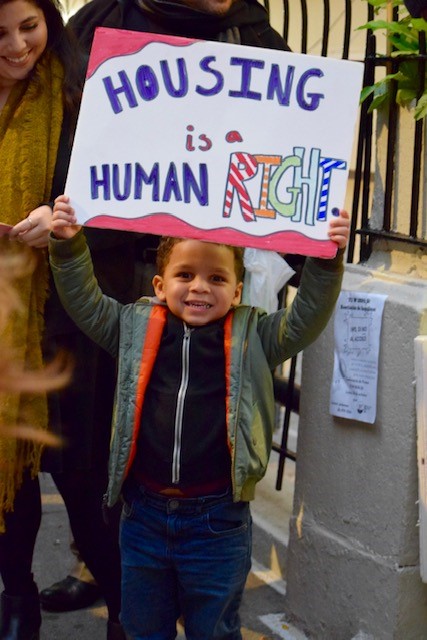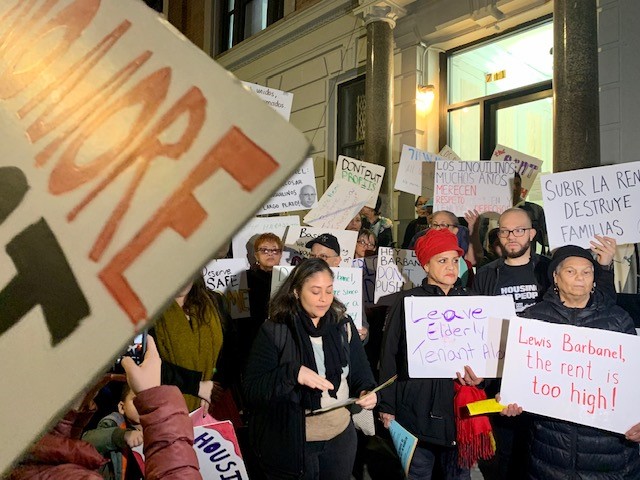
The ANHD Blog raises the profile of our issues, and educates our member groups, city decision makers, and the general public on our core issue areas. The ANHD Blog offers sharp, timely and effective commentary on key public policy issues, as well as our work and the work of our member groups.
All of our blogs are sorted based on the issues, projects, special tags, and dates they are associated with, and you can use the dropdowns below to filter through our blogs based on these tags. Additionally, you can do a general search through our blog, using the search bar the right. If you can’t find what you are looking for, email comms@anhd.org.
Tenants Set a Precedent for Fighting Landlord Harassment
How the Certificate of No Harassment Pilot Program Works & What It Means for Building Tenant Power
Tenants from 711 West 180th Street went before the Office of Administrative Trials and Hearings (OATH) for the first time yesterday to testify about the harassment they’ve endured under their landlord, Lewis Barbanel of Barberry Rose Management. This is the first building included in the Certificate of No Harassment (CONH) Pilot Program to go before an OATH judge.
 The CONH Pilot Program went into effect on October 12, 2018 and is intended to disincentivize harassment by requiring landlords who want to make significant renovations to their buildings get a Certificate of No Harassment (CONH) from the NYC Office of Housing Preservation and Development (HPD) before certain construction permits through the NYC Department of Buildings (DOB) are approved. We know that landlords are motivated by profit, and we know landlords need DOB permits to make most renovations. CONH disrupts the cycle of harassment by preventing landlords from profiting off of it. More than 1,000 buildings — or 25,000+ apartments — across New York City are part of the CONH Pilot Program.
The CONH Pilot Program went into effect on October 12, 2018 and is intended to disincentivize harassment by requiring landlords who want to make significant renovations to their buildings get a Certificate of No Harassment (CONH) from the NYC Office of Housing Preservation and Development (HPD) before certain construction permits through the NYC Department of Buildings (DOB) are approved. We know that landlords are motivated by profit, and we know landlords need DOB permits to make most renovations. CONH disrupts the cycle of harassment by preventing landlords from profiting off of it. More than 1,000 buildings — or 25,000+ apartments — across New York City are part of the CONH Pilot Program.
When HPD has a reason to believe that harassment is happening — and there is no previous New York State Division of Homes and Community Renewal (HCR) or court finding of harassment — they will hold a hearing where tenants, community organizations, and other stakeholders can testify. This is a real opportunity for tenants who are being harassed to have their voices heard. Over the last month, tenants from the 711 West 180th Street Tenants Association have been working with organizers at the Met Council on Housing to prepare testimony that demands the program follow through with its goal of preventing displacement through tenant harassment.
The landlord, Lewis Barbanel, who bought the building in December 2015, claims there has been no harassment, while the building’s majority elderly residents have experienced depreciating services, such as a broken intercom, no heat, and mold-infested walls. The building has 143 open violations across 18 apartments, an average of 7.9 violations per apartment, which is much higher than the city-wide average of 0.7 per residential unit. Over 100 of these classify as B and C violations, which refer to serious hazards like exposed electrical wiring and mouse infestations — living conditions that no one should have to endure.
Once the hearing is complete, the HPD commissioner will decide to either grant Lewis Barbanel a CONH or deny it. Owners found to have a history of harassing tenants will be denied a CONH and won’t be able to make any significant changes to their buildings for five years, unless they provide permanently affordable housing, which must be built without city subsidy, tax benefits, or inclusionary housing.
This past summer marked a historic victory for the tenant movement in New York State with the passage of rent reform in Albany. But even with historic wins like these, we need to leverage all the tools at our disposal to eliminate tenant displacement, and programs like CONH are only as effective as we make them. Currently, CONH is a three-year pilot program, and if it works, the New York City Council can make it a permanent law and expand it to include more buildings and tenants. But the City needs to see that the program is working in order to do that. This is about changing landlord behavior. We want landlords to know that if they harass tenants, it will hurt their pockets.

After the first day of hearings, the tenants of 711 West 180th Street held a press conference in front of their building. They all spoke about their personal experiences with harassment directly from Lewis Barbanel and chanted, “Inquilinos unidos, jamás serán vencidos… The tenants united, will never be defeated!”
When done right, policies and programs like the Certificate of No Harassment, can not only prevent harassment and displacement, but protect the stock of affordable housing and ensure that New Yorkers can stay in their communities.
What is the Coalition Against Tenant Harassment (CATH)?
CATH is a city-wide coalition of community organizations who are fighting against the displacement of low-income tenants through organizing and by advocating for stronger laws, like the Certificate of No Harassment (CONH), that prevent harassment and ensure that tenants can stay in their homes. We know that long-term residents, who are often low-income people of color, are at high risk for displacement, since pushing these tenants out gives landlords the opportunity to make renovations, raise rents, and increase their profits.
Learn more at enddisplacement.org.

